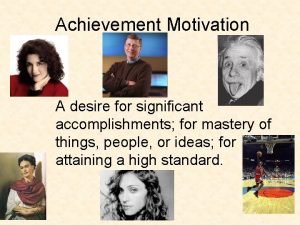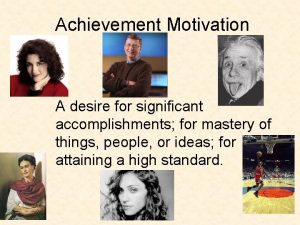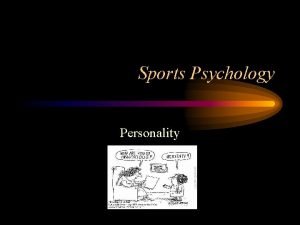Sport Psychology Achievement Motivation Achievement Motivation Personality characteristics










- Slides: 10

Sport Psychology Achievement Motivation

Achievement Motivation • Personality characteristics and the intrinsic motives to participate and achieve in sport are linked • The type of personality you are may determine how motivated you are • Personality characteristics related to motivation are called achievement motivation

Achievement Motivation • Atkinson (1964) viewed achievement motivation as arising from the personality trait characteristics • Split into two groups – High drive to succeed (need to achieve - Nach) – High fear of failure (need to avoid failure - Naf)

Achievement Motivation • I do not play to win, I play to fight against the idea of losing’ (Eric Cantona)

Achievement Motivation = Nach - Naf

Need to Achieve (Nach) • This is a personality type that involves the following characteristics; – They persist on the task – The complete the task quickly – They take risks – They take personal responsibility for their actions – They like feedback about their performance

Need to Avoid Failure (Naf) • People with a Naf personality have the following characteristics; – They give up easily – They take their time to complete the task – They avoid challenging situations will choose much higher/lower skill level as they are less threatening – They do not take personal responsibility for their actions

Changing Naf to Nach • You can devise strategies to improve performance; – Make sure goals are challenging but achievable – Give early success – Show role models that have been successful – Be supportive and encouraging • Give positive reinforcement – Use rewards – Seek to lower anxiety levels

Attribution Theory • Reasons we give for an outcome are called ‘Attributions. ’ We make them about ourselves and others. • They affect our motivation levels • We need to understand the outcome so we learn from our experiences • They will effect out future expectations of success & failure

Attribution Theory • • • Attributions fall into four categories: 1) ability or skill 2) effort (physical & mental) 3) luck (rub of the green, weather, ref) 4) task difficulty (problems of the task e. g. strength of opposition, difficulty of the shot)
 Achievement motivation theory in sport
Achievement motivation theory in sport Definition of motivation in sport psychology
Definition of motivation in sport psychology A desire for significant accomplishment
A desire for significant accomplishment Achievement motivation definition
Achievement motivation definition Organizational theory pmp
Organizational theory pmp Achievement motivation is the desire for
Achievement motivation is the desire for Achievement vs aptitude tests ap psychology
Achievement vs aptitude tests ap psychology Binet ap psych
Binet ap psych Hollander structure of personality
Hollander structure of personality History of sport psychology
History of sport psychology Sport and exercise psychology definition
Sport and exercise psychology definition



















